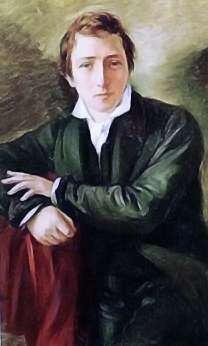
Where they burn books, they will too in the end burn people.

Memory plaque Marktplatz Neustadt an der Weinstrasse
Christian Johann Heinrich Heine (December 13, 1797 – February 17, 1856) was a journalist, an essayist, and one of the most significant German romantic poets. Jewish by birth, he converted to Lutheran Christianity as an adult.
Quotes
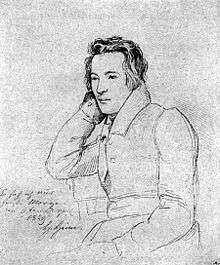
Out of my own great woe
I make my little songs.
I make my little songs.

I cannot explain the sadness
That's fallen on my breast.
An old, old fable haunts me,
And will not let me rest.
That's fallen on my breast.
An old, old fable haunts me,
And will not let me rest.
- Out of my own great woe
I make my little songs.- Aus Meinen Grossen Schmerzen (Out of My Great Woe), st. 1
- Ich weiss nicht, was soll es bedeuten,
Dass ich so traurig bin;
Ein Märchen aus alten Zeiten,
Das kommt mir nicht aus dem Sinn.- I cannot explain the sadness
That's fallen on my breast.
An old, old fable haunts me,
And will not let me rest.- Die Lorelei, st. 1
- I cannot explain the sadness
- Du bist wie eine Blume,
So hold und schön und rein;
Ich schau dich an, und Wehmut
Schleicht mir ins Herz hinein.- You're lovely as a flower,
So pure and fair to see;
I look at you, and sadness
Comes stealing over me.- Du Bist Wie eine Blume, st. 1
- You're lovely as a flower,
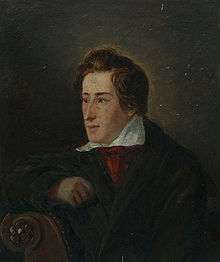
At first I was almost about to despair, I thought I never could bear it — but I did bear it. The question remains: how?
- At first I was almost about to despair, I thought I never could bear it — but I did bear it. The question remains: how?
- An Karl von U.
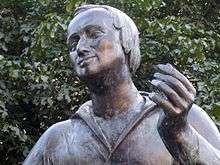
Mark this well, you proud men of action: You are nothing but the unwitting agents of the men of thought who often, in quiet self-effacement, mark out most exactly all your doings in advance.
Ich hatte einst ein schönes Vaterland.
Der Eichenbaum
Wuchs dort so hoch, die Veilchen nickten sanft.
Es war ein Traum.'Das küßte mich auf deutsch und sprach auf deutsch
(Man glaubt es kaum
Wie gut es klang) das Wort: "Ich liebe dich!"
Es war ein Traum.I had once a beautiful fatherland.
The oak tree
Grew so high there, violets nodded softly.
It was a dream.It kissed me in German and spoke in German
(You would hardly believe
How good it sounded) the words: "I love you!"
It was a dream.- In Der Fremde (In a Foreign Land)
- Dort wo man Bücher verbrennt, verbrennt man auch am Ende Menschen.
- Where they have burned books, they will end in burning human beings.
- Almansor: A Tragedy (1823), as translated in True Religion (2003) by Graham Ward, p. 142
- Variant translations:
- Wherever books are burned, men in the end will also burn.
- Where they burn books, at the end they also burn people.
- Where they burn books, they will also burn people.
- It is there, where they burn books, that eventually they burn people.
- Where they burn books, so too will they in the end burn human beings.
- Where they burn books, they also burn people.
- Them that begin by burning books, end by burning men.
- Where they have burned books, they will end in burning human beings.
- Every woman is the gift of a world to me.
- Ideas: The Book Le Grand (1826)
He who will establish himself on a certain height must yield according to circumstances, like the weather-cock on a church-spire, which, though it be made of iron, would soon be broken by the storm-wind if it remained obstinately immovable, and did not understand the noble art of turning to every wind.
- Don't send a poet to London.
- English Fragments (1828), Ch. 2 : London
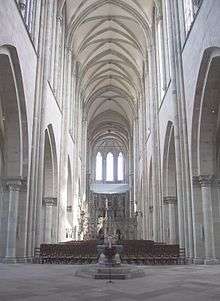
People in those old times had convictions; we moderns only have opinions. And it needs more than a mere opinion to erect a Gothic cathedral.
- He who will establish himself on a certain height must yield according to circumstances, like the weather-cock on a church-spire, which, though it be made of iron, would soon be broken by the storm-wind if it remained obstinately immovable, and did not understand the noble art of turning to every wind. But a great man will never so far contradict his own feelings as to see, or, it may be, increase, with cold-blooded indifference, the misfortunes of his fellow country-men.
- English Fragments (1828), Ch. 11 : The Emancipation
- Variant: The weather-cock on the church spire, though made of iron, would soon be broken by the storm-wind if it did not understand the noble art of turning to every wind.

Wild, dark times are rumbling toward us, and the prophet who wishes to write a new apocalypse will have to invent entirely new beasts, and beasts so terrible that the ancient animal symbols of St. John will seem like cooing doves and cupids in comparison.
- Christianity is an idea, and as such is indestructible and immortal, like every idea.
- History of Religion and Philosophy in Germany, Vol. I (1834)
- Mark this well, you proud men of action: You are nothing but the unwitting agents of the men of thought who often, in quiet self-effacement, mark out most exactly all your doings in advance.
- History of Religion and Philosophy in Germany, Vol. III (1834)

Great genius takes shape by contact with another great genius, but less by assimilation than by friction.
- People in those old times had convictions; we moderns only have opinions. And it needs more than a mere opinion to erect a Gothic cathedral.
- Französische Bühne (The French Stage), ch. 9 (1837)
- If one has no heart, one cannot write for the masses.
- Letter to Julius Campe (March 18, 1840)
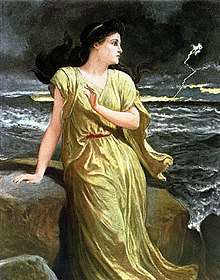
What! Think you that my flashes show me
Only in lightnings to excel?
Believe me, friends, you do not know me,
For I can thunder quite as well.
Only in lightnings to excel?
Believe me, friends, you do not know me,
For I can thunder quite as well.
- Wild, dark times are rumbling toward us, and the prophet who wishes to write a new apocalypse will have to invent entirely new beasts, and beasts so terrible that the ancient animal symbols of St. John will seem like cooing doves and cupids in comparison.
- Lutetia; or, Paris. From the Augsberg Gazette, 12, VII (1842)
- The future smells of Russian leather, of blood, of godlessness and of much whipping. I advise our grandchildren to come into the world with very thick skin on their backs.
- Lutetia; or, Paris. From the Augsberg Gazette, 12, VII (1842)
- No talent, but a character.
- Atta Troll, ch. 24 (1843)
- Ordinarily he is insane, but he has lucid moments when he is only stupid.
- Of Savoye, appointed ambassador to Frankfurt by Lamartine (1848); as quoted in Insults : A Practical Anthology of Scathing Remarks and Acid Portraits (1941) by Max John Herzberg, p. 74
- One should forgive one's enemies, but not before they are hanged.
- Statement of 1848, as quoted in The Cynic's Lexicon : A Dictionary of Amoral Advice (1984) by Jonathon Green, p. 91
- One must forgive one's enemies, but not before they are hanged.
- As quoted in A Mania for Sentences (1985) by Dennis Joseph Enright, p. 10
- So we keep asking, over and over,
Until a handful of earth
Stops our mouths —
But is that an answer?- Lazarus, I (1854)
- Rossini! divino Maestro!
- Rossini, divine master.
- Heinrich Heine's Pictures of Travel (1855) as translated by Charles Godfrey Leland, p. 270
- Rossini, divine master.
- Bien sûr, il me pardonnera; c'est son métier. [Of course he [God] will forgive me; that’s his job.]
- Death-bed joke (1856), attributed as last words; quoted in French in The Joke and Its Relation to the Unconscious (1905) by Sigmund Freud, as translated by Joyce Crick (2003).
- Quoted as “Gott wird mir verzeihen, das ist sein Beruf.” in Letzte Worte auf dem Totenbett. Quelle: Alfred Meißner: "Heinrich Heine. Erinnerungen" (1856), Kapitel 5
- Variant translation: Why, of course, he will forgive me; that's his business.
- As quoted in Heinrich Heine (1937) by Louis Untermeyer
- If the Romans had been obliged to learn Latin, they would never have found time to conquer the world.
- As quoted in The Medical Record No. 674 (6 October 1883); also in And I Quote : The Definitive Collection of Quotes, Sayings, and Jokes for the Contemporary Speechmaker (1992) by Ashton Applewhite, Tripp Evans and Andrew Frothingham, p. 447
- Great genius takes shape by contact with another great genius, but less by assimilation than by friction.
- As quoted in Dictionary of Quotations from Ancient and Modern English and Foreign Sources (1899) by James Wood, p. 6
- My songs, they say, are poisoned.
How else, love, could it be?
Thou hast, with deadly magic,
Poured poison into me.- Lyrical Intermezzo, 57; in Poems of Heinrich Heine: Three Hundred and Twenty-five Poems (1917) Selected and translated by Louis Untermeyer, p. 73
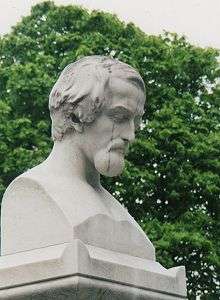
Experience is a good school. But the fees are high.
- Oh what lies there are in kisses!
And their guile so well prepared!
Sweet the snaring is; but this is
Sweeter still, to be ensnared.- The Home-coming, Poem 74; also in Poems of Heinrich Heine: Three Hundred and Twenty-five Poems (1917) Selected and translated by Louis Untermeyer, p. 134
- What! Think you that my flashes show me
Only in lightnings to excel?
Believe me, friends, you do not know me,
For I can thunder quite as well.- Wartet nur! [Only Wait!] in Poems for the Times ; also in Poems of Heinrich Heine: Three Hundred and Twenty-five Poems (1917) Selected and translated by Louis Untermeyer, p. 262
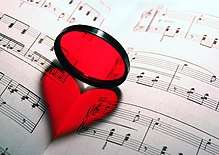
When words leave off, music begins.
- Oaks shall be rent; the Word shall shatter —
Yea, on that fiery day, the Crown,
Even the palace walls shall totter,
And domes and spires come crashing down.- Wartet nur! [Only Wait!] in Poems for the Times ; also in Poems of Heinrich Heine: Three Hundred and Twenty-five Poems (1917) Selected and translated by Louis Untermeyer, p. 263
- Experience is a good school. But the fees are high.
- As quoted in The Modern Handbook of Humor (1967) by Ralph Louis Woods, p. 493
- When words leave off, music begins.
- As quoted in Peter's Quotations : Ideas for Our Time (1977) by Laurence J. Peter, p. 343
- The music at a wedding procession always reminds me of the music of soldiers going into battle.
- As quoted in The Cynic's Lexicon : A Dictionary of Amoral Advice (1984) by Jonathon Green
- Variant translation: The Wedding March always reminds me of the music played when soldiers go into battle.
- As quoted in The Routledge Dictionary of Quotations (1987) by Robert Andrews, p. 281
- Whatever tears one may shed, in the end one always blows one's nose.
- As quoted in The Routledge Dictionary of Quotations (1987) by Robert Andrews, p. 60
- The fundamental evil of the world arose from the fact that the good Lord has not created money enough.
- As quoted in The Pillars of Economic Understanding : Factors and Markets (2000) by Mark Perlman and Charles Robert McCann
- There are more fools in the world than there are people.
- As quoted in One Big Fib : The Incredible Story of the Fraudulent First International Bank of Grenada (2003) by Owen Platt, p. 37
- Music is a strange thing. I would almost say it is a miracle.
- Letters on the French Stage (1837)
- Christianity - and that is its greatest merit - has somewhat mitigated that brutal Germanic love of war, but it could not destroy it. Should that subduing talisman, the cross, be shattered, the frenzied madness of the ancient warriors, that insane Berserk rage of which Nordic bards have spoken and sung so often, will once more burst into flame. This talisman is fragile, and the day will come when it will collapse miserably. Then the ancient stony gods will rise from the forgotten debris and rub the dust of a thousand years from their eyes, and finally Thor with his giant hammer will jump up and smash the Gothic cathedrals.
- "The History of Religion and Philosophy in Germany" (1834)
- Do not smile at my advice -- the advice of a dreamer who warns you against Kantians, Fichteans, and philosophers of nature. Do not smile at the visionary who anticipates the same revolution in the realm of the visible as has taken place in the spiritual. Thought precedes action as lightning precedes thunder. German thunder is of true Germanic character; it is not very nimble, but rumbles along ponderously. Yet, it will come and when you hear a crashing such as never before has been heard in the world's history, then you know that the German thunderbolt has fallen at last. At that uproar the eagles of the air will drop dead, and lions in the remotest deserts of Africa will hide in their royal dens. A play will be performed in Germany which will make the French Revolution look like an innocent idyll.
- "The History of Religion and Philosophy in Germany" (1834)
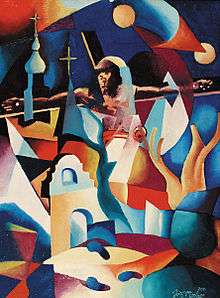
The duration of religions has always been dependent on human need for them. Christianity has been a blessing for suffering humanity... it has been providential, divine, holy. Eternal praise is due to the symbol of that suffering God, the Saviour with the crown of thorns, the crucified Christ, whose blood was as a healing balm that flowed into the wounds of humanity.
- I believe in progress; I believe that happiness is the goal of humanity, and I cherish a higher idea of the Divine Being than those pious folk who suppose that man was created only to suffer. Even here on earth I would strive, through the blessings of free political and industrial institutions, to bring about that reign of felicity which, in the opinion of the pious, is to be postponed till heaven is reached after the day of Judgment. The one expectation is perhaps as vain as the other; there may be no resurrection of humanity either in a political or in a religious sense. Mankind, it may be, is doomed to eternal misery ; the nations are perhaps under a perpetual curse, condemned to be trodden under foot by despots, to be made the instruments of their accomplices and the laughing-stocks of their menials. Yet, though all this be the case, it will be the duty even of those who regard Christianity as an error still to uphold it ; and men must journey barefoot through Europe, wearing monks' cowls, preaching the doctrine of renunciation and the vanity of all earthly possessions, holding up before the gaze of a scourged and despised humanity the consoling Cross, and promising, after death, all the glories of heaven.
The duration of religions has always been dependent on human need for them. Christianity has been a blessing for suffering humanity during eighteen centuries ; it has been providential, divine, holy. All that it has done in the interest of civilisation, curbing the strong and strengthening the weak, binding together the nations through a common sympathy and a common tongue, and all else that its apologists have urged in its praise all this is as nothing compared with that great consolation it has bestowed on man. Eternal praise is due to the symbol of that suffering God, the Saviour with the crown of thorns, the crucified Christ, whose blood was as a healing balm that flowed into the wounds of humanity. The poet especially must acknowledge with reverence the terrible sublimity of this symbol.
- The whole system of symbolism impressed on the art and the life of the Middle Ages must awaken the admiration of poets in all times. In reality, what colossal unity there is in Christian art, especially in its architecture! These Gothic cathedrals, how harmoniously they accord with the worship of which they are the temples, and how the idea of the Church reveals itself in them! Everything about them strives upwards, everything transubstantiates itself; the stone buds forth into branches and foliage, and becomes a tree; the fruit of the vine and the ears of corn become blood and flesh; the man becomes God; God becomes a pure spirit. For the poet, the Christian life of the Middle Ages is a precious and inexhaustibly fruitful field. Only through Christianity could the circumstances of life combine to form such striking contrasts, such motley sorrow, such weird beauty, that one almost fancies such things can never have had any real existence, and that it is all a vast fever-dream the fever-dream of a delirious deity. Even Nature, during this sublime epoch of the Christian religion, seemed to have put on a fantastic disguise; for oftentimes though man, absorbed in abstract subtilties, turned away from her with abhorrence, she would recall him to her with a voice so mysteriously sweet, so terrible in its tenderness, so powerfully enchanting, that unconsciously he would listen and smile, and become terrified, and even fall sick unto death.
- In my latest book, "Komancero," I have explained the transformation that took place within me regarding sacred things. Since its publication many inquiries have been made, with zealous importunity, as to the manner in which the true light dawned upon me. Pious souls, thirsting after a miracle, have desired to know whether, like Saul on the way to Damascus, I had seen a light from heaven; or whether, like Balaam, the son of Beor, I was riding on a restive ass, that suddenly opened its mouth and began to speak as a man? No ; ye credulous believers, I never journeyed to Damascus, nor do I know anything about it, save that lately the Jews there were accused of devouring aged monks of St. Francis; and I might never have known even the name of the city had I not read the Song of Solomon, wherein the wise king compares the nose of his beloved to a tower that looketh towards Damascus. Nor have I ever seen an ass, at least any four-footed one, that spake as a man, though I have often enough met men who, whenever they opened their mouths, spake as asses.
In truth, it was neither a vision, nor a seraphic revelation, nor a voice from heaven, nor any strange dream or other mystery that brought me into the way of salvation; and I owe my conversion simply to the reading of a book. A book? Yes, and it is an old, homely-looking book, modest as nature and natural as it; a book that has a work-a-day and unassuming look, like the sun that warms us, like the bread that nourishes us; a book that seems to us as familiar and as full of kindly blessing as the old grandmother who reads daily in it with dear, trembling lips, and with spectacles on her nose. And this book is called quite shortly the Book, the Bible. Rightly do men also call it the Holy Scripture; for he that has lost his God can find Him again in this Book, and towards him that has never known God it sends forth the breath of the Divine Word. The Jews, who appreciate the value of precious things, knew right well what they did when, at the burning of the second temple, they left to their fate the gold and silver implements of sacrifice, the candlesticks and lamps, even the breastplate of the High Priest adorned with great jewels, but saved the Bible. This was the real treasure of the Temple, and, thanks be to God!
The Romantic School (1836)
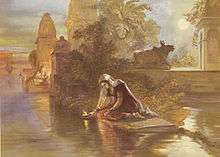
On Wings of Song,
Sweetheart, I carry you away,
Away to the fields of the Ganges,
Where I know the most beautiful place..
Sweetheart, I carry you away,
Away to the fields of the Ganges,
Where I know the most beautiful place..
- Die Romantische Schule as translated by H. Mustard (New York: 2002)
- Full text in German
- Ich spreche von jener Religion, in deren ersten Dogmen eine Verdammnis alles Fleisches enthalten ist, und die dem Geiste nicht bloß eine Obermacht über das Fleisch zugesteht, sondern auch dieses abtöten will, um den Geist zu verherrlichen; ich spreche von jener Religion, durch deren unnatürliche Aufgabe ganz eigentlich die Sünde und die Hypokrisie in die Welt gekommen, indem eben durch die Verdammnis des Fleisches die unschuldigsten Sinnenfreuden eine Sünde geworden und durch die Unmöglichkeit, ganz Geist zu sein, die Hypokrisie sich ausbilden mußte.
- I am speaking of the religion whose earliest dogmas contain a condemnation of the flesh, and which not merely grants the spirit superiority over the flesh but also deliberately mortifies the flesh in order to glorify the spirit. I am speaking of the religion whose unnatural mission actually introduced sin and hypocrisy into the world, since just because of the condemnation of the flesh the most innocent pleasures of the senses became a sin and just because of the impossibility of our being wholly spirit hypocrisy inevitably developed.
- p. 3
- I am speaking of the religion whose earliest dogmas contain a condemnation of the flesh, and which not merely grants the spirit superiority over the flesh but also deliberately mortifies the flesh in order to glorify the spirit. I am speaking of the religion whose unnatural mission actually introduced sin and hypocrisy into the world, since just because of the condemnation of the flesh the most innocent pleasures of the senses became a sin and just because of the impossibility of our being wholly spirit hypocrisy inevitably developed.
- Wenn man auch der protestantischen Kirche manche fatale Engsinnigkeit vorwirft, so muß man doch zu ihrem unsterblichen Ruhme bekennen: indem durch sie die freie Forschung in der christlichen Religion erlaubt und die Geister vom Joche der Autorität befreit wurden, hat die freie Forschung überhaupt in Deutschland Wurzel schlagen und die Wissenschaft sich selbständig entwickeln können. Die deutsche Philosophie, obgleich sie sich jetzt neben die protestantische Kirche stellt, ja sich über sie heben will, ist doch immer nur ihre Tochter; als solche ist sie immer in betreff der Mutter zu einer schonenden Pietät verpflichtet.
- Although the Protestant Church is accused of much disastrous bigotry, one claim to immortal fame must be granted it: by permitting freedom of inquiry in the Christian faith and by liberating the minds of men from the yoke of authority, it enabled freedom of inquiry in general to take root in Germany, and made it possible for science to develop independently. German philosophy, though it now puts itself on an equal basis with the Protestant Church or even above it, is nonetheless only its daughter; as such it always owes the mother a forbearing reverence.
- p. 24
- Although the Protestant Church is accused of much disastrous bigotry, one claim to immortal fame must be granted it: by permitting freedom of inquiry in the Christian faith and by liberating the minds of men from the yoke of authority, it enabled freedom of inquiry in general to take root in Germany, and made it possible for science to develop independently. German philosophy, though it now puts itself on an equal basis with the Protestant Church or even above it, is nonetheless only its daughter; as such it always owes the mother a forbearing reverence.
- Hence the one-sided errors—ces erreurs d'idée fixe—which we cannot escape when we stand too near to one or the other party; either deceives, yet does it unaware, and we confide most willingly in those who think as we do. But if we are by chance of such indifferent nature that we, without special predilection, keep in continual intercourse with all, then we are bewildered by the perfect self-confidence of either party, and our judgement is neutralised in the most depressing manner.
- French Affairs page 156
Disputed
- Money bequeathed to my wife "on the express condition that she remarry. I want at least one person to be truly bereaved by my death."
- Testamentary Will of Heinrich Heine (1856); no published source for this has been located.
Misattributed
- You cannot feed the hungry on statistics.
- Every man, either to his terror or consolation, has some sense of religion.
- James Harrington in The Commonwealth of Oceana (1656)
- Talking and eloquence are not the same: to speak and to speak well are two things. A fool may talk, but a wise man speaks.
- True eloquence consists in saying all that is necessary, and nothing but what is necessary.
Quotes about Heine
- Heine says that a true autobiography is almost an impossibility, and that man is bound to lie about himself.
- Fyodor Dostoevsky in Notes from the Underground (1864); this has led to the statement "True autobiography is almost an impossibility" being quoted as a direct quote of Heine.
External links
- Profile at Deutsche Welle
- Works by Heinrich Heine at Project Gutenberg
- Complete works of Heine online (in German)
- Works by by or about Heinrich Heine at the Internet Archive
- Selected English translations online
- Art of the States: The Resounding Lyre - musical setting of Heine's poem "Halleluja"
This article is issued from
Wikiquote.
The text is licensed under Creative
Commons - Attribution - Sharealike.
Additional terms may apply for the media files.